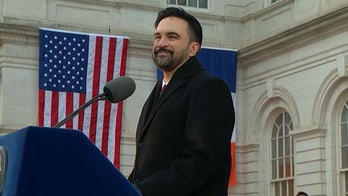McConnell, White House spar over Supreme Court nomination
Senate Majority Leader Mitch McConnell and White House Chief of Staff Denis McDonough on 'Fox News Sunday'
Senate Majority Leader Mitch McConnell, in an implicit jab at Republican primary front-runner Donald Trump, said he is “increasingly optimistic" that voting at the Republican National Convention in July will go to a second ballot.
The comments, made over the weekend to WHAS-TV in Louisville, represent a break of sorts for the Kentucky Republican who has sought in public to remain neutral on the race. While McConnell did not openly criticize any candidate, the senator seemed to be rooting for a contested convention – something Trump is battling to avoid, as he tries to lock up the nomination outright before July.
"I'm increasingly optimistic that there actually may be a second ballot," McConnell told WHAS-TV.
"I want somebody who can win in November and the whole process is about trying to beat Hillary Clinton in November," he said. "And I think our delegates, if they end up actually having the latitude to make a decision, which would occur on the second and third ballot, are going to be interested in who can win."
A candidate would have to amass the support of 1,237 delegates in order to clinch the nomination. While it's still possible for Trump to reach that number ahead of the GOP convention in Cleveland, it'll be tough. If Trump cannot reach that threshold, voting would proceed to a second ballot at the convention, with a majority of delegates free to vote for whomever they choose.
And Texas Sen. Ted Cruz has been working tirelessly to get allies elected as delegates so they could be in place to support him on subsequent rounds of voting. Ohio Gov. John Kasich, too, while trailing badly in the delegate race, is holding out hope for a contested convention.
It’s a process Trump has decried as “rigged.” But McConnell’s comments, combined with Cruz’s recent success in the behind-the-scenes delegate-selection battle, only raise the pressure on Trump to try and avoid that process entirely -- by securing the nomination outright.
He’ll have his next chance on Tuesday when New York state holds its primary. Both Trump and Democratic candidate Hillary Clinton are fighting for a rebound in the delegate-rich contest after recent setbacks.
Yet for both primary front-runners, simply winning is not necessarily enough.
For Clinton, she’s looking for a big victory to not only disrupt rival Bernie Sanders’ winning streak but blunt his claims of “momentum” in the Democratic race.
For Trump, he needs to score over 50 percent of the statewide vote to have a shot at taking home all 95 of the state’s delegates. Trump has been campaigning heavily in the state toward that goal, and most recent polls shows him with just over 50 percent support in the state, holding a huge double-digit lead over the rest of the field.
In his interview, McConnell said that if voting at the convention does go to a second round, it would then be up to Trump, Cruz, Kasich "or anyone else," to make the electability argument.
McConnell said that he anticipates he himself will be a delegate, and "on the second ballot I'll be free to do whatever I want."
"There are some candidates suggesting it's somehow tricky to simply follow the rules of the convention," McConnell said, in an apparent reference to Trump's complaints about the process. "We're going to follow the rules of the convention."
In response to his interviewer's questions, McConnell ruled himself out of contention, although there has been little if any talk about such a scenario. He also said he believes House Speaker Paul Ryan's disavowals of interest in the nomination, something that remains a topic of speculation despite Ryan's attempts to shut it down.
"It really will be up to the delegates," McConnell said. "I mean this notion that there's some group of people in Washington that can handpick somebody and deliver it is not true. If there were such a group I would probably be a part of it, but there isn't a group."
The Associated Press contributed to this report.

























